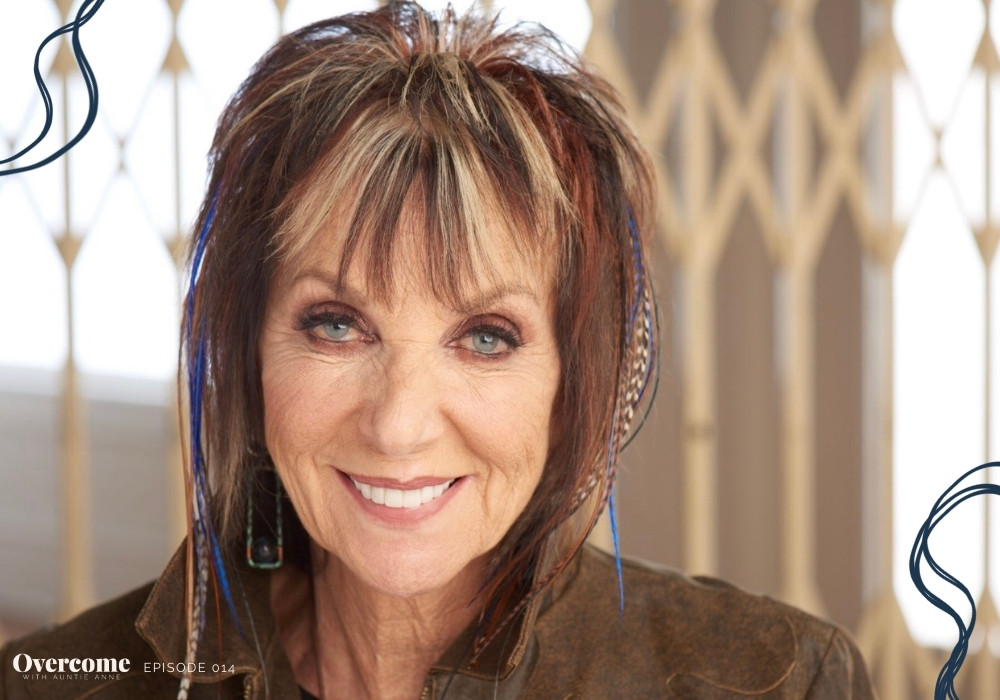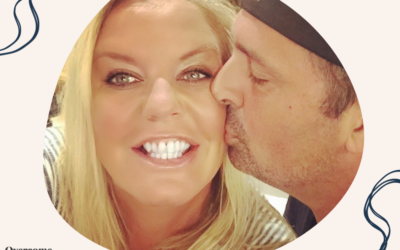Sometimes our personal stories of overcoming are part of a line of stories about overcomers who have come before us—you could say we have a heritage of overcoming. And oftentimes, remembering that heritage gives us strength. Lily Isaacs is one of those people whose heritage is one of overcoming.
She was born in Germany after WWII to two Polish Jewish parents and immigrated to the United States when she was two years old. Given what Lily’s parents endured during the war, it’s a wonder they met and she was born. But because of their continued persistence, and a couple of miracles along the way, Lily is here today and is now the matriarch of the family award-winning bluegrass Southern gospel group, The Isaacs.
Her testimony has been an inspiration to people around the world, and her love for Jesus has brought her through every single chapter of her life. And she loves to sing about and share this love with others. So I encourage you to listen the podcast to hear Lily’s story or keep reading below to catch some of the highlights.
Children of the Holocaust
What makes Lily’s story so interesting is that both of her parents were victims of the Holocaust. And while most of their collective families were killed during WWII, they both survived, each with their own story of overcoming.
Lily’s mother was one of five children. As Lily conveys, when the war started, there wasn’t abundant communication about what was happening in the world because people didn’t have social media or television, and very few even had radios. Regardless, she says, “there was unrest in a lot of the small towns in Poland and all over Europe.”
Through word of mouth people were hearing that the Nazi party from Germany was taking people from their homes, specifically Jewish people. And while they weren’t sure what the Nazis were doing with those they took, it was believed they were possibly being taken to work camps.
Somehow (miraculously?), Lily’s grandmother found out that the Nazis were coming to their home town, so she told Lily’s mother, brother, and youngest sister to go to the next town over to get potatoes. Although Lily’s mother was a little hesitant—since there was a store in their own town that sold potatoes—she listened to her mother, took her siblings, and went. When they got back, everyone was gone, and they had no idea what had happened to them.
The next day the Nazis returned, and Lily’s mother, sister, and brother were taken to the ghettos, put in bunkers, fed very little, and made to do work. They still had no idea what was happening or where the rest of their family was, and at first, thought they might be going to meet up with them and returning home. But months went by.
Lily’s mother’s brother decided that he was going to run away with some other boys and eventually did. Months later, Lily’s mother found out that the boys who ran away, including her brother, had been “machine gunned down … on the spot.”
Eventually Lily’s mother and aunt were sent to a concentration camp. Lily says that while they were there, they lived in inhumane conditions, were forced to work, and “every day they’d get a crusty bread and a bowl of water with grass in it—it was supposed to be soup … that’s all they got to eat all day.”
While there, the Nazis would perform roll calls and put everyone in different lines. One day when this happened, Lily’s mother got separated from her sister and their friend, Sabrina, and was put in a different line. But Sabrina reached over, grabbed Lily’s mother, and put her in the line with her and Lily’s sister. While this normally would have meant Sabrina would be shot on the spot, the soldiers either “didn’t see it, or they didn’t say anything,” Lily says.
Later that day, they found out that the line Lily’s mother had been in went to the gas chambers, while the line Sabrina pulled her into got food rations. Miraculously, Lily’s mother was saved by her friend.
The history behind Lily’s dad’s family was unknown, but in 2018, Lily found out from the Holocaust Remembrance that her father’s parents and five siblings were all taken one day when her father wasn’t home. They were sent to a concentration camp and were killed in the gas chambers. Only her dad and brother were spared.
Eventually, her dad was sent to a concentration camp too. One day he was walking up and down a ladder doing work but stopped for a minute because it was hot out. A soldier came over and hit him in the head with a brick and left him to die. He doesn’t know how long he was out, but when he woke up, there was blood all around, and it was a miracle he was still alive.
While both of Lily’s parents were in separate concentration camps, they both survived and ended up in a French army relief camp in Munich, Germany after the war was over. That’s where they met and eventually got married. And Munich is where Lily was born.
Coming to the United States
In those days, a family needed a sponsor to move to a new country—someone to help them get set up with a new life in that country. Lily’s mother had an uncle that lived in the states, so he sponsored her family and sent for them.
When Lily was two years old, she boarded a ship with her mother and father, and sailed for the United States. (She doesn’t remember any of this, just what she’s been told). They landed in New York City just past the Statue of Liberty, and her parents relayed their excitement “because they knew they were getting another chance at life.”
After settling in New York City, Lily’s uncle helped her father become a bread baker. And although Lily and her parents spoke Yiddish in their home, her parents learned English by going to night school. Lily started speaking it better once she started kindergarten.
Asking “Why God?”
Lily recalls her mother telling a story of questioning God. She told of this one time when they were on a train for three days. They were so crammed in the train cars that when someone died, they had no place to fall down. They didn’t have food or water or toilets. But every now and then it would rain, and little drops of water would fall through the cracks, and everyone opened their mouths to drink those drops.
While standing there, Lily’s mother asked, “God, where is the world? Where is the whole world? Why are we here? Why isn’t anyone helping us?” But, she said, “Nobody came.”
While I’m not trying to make a comparison with those who went through the Holocaust, I do know that sometimes we have our own dark moments—times of isolation, disappointment, and pain. And we wonder where everybody is and why nobody is coming to help us.
Lily says it’s like Jesus who called out on the cross, “Father, why have you forsaken me?” She believes it’s a human emotion to feel those things.
My late friend Richard Dobbins says, “Alone we die. Connected we live.” Loneliness is one of the things I’ve experienced most in my own life. Sometimes it’s debilitating, and you truly want to die. But we are created to connect with one another.
And one way we do that is through sharing stories, our stories, our family’s stories, past and present. We share because sharing brings connection and freedom. And through that, we live.
Love of music
Lily’s parent’s story of overcoming gave her the opportunity to become who she is today. As Lily puts it, the war robbed her parents of their teenage years. But so much was given back to them with the start of a new life. And one of those things was music and Broadway. Lily’s mother became a lover of Broadway and would sing the songs she knew while dancing around the house.
That love for music transferred to Lily, and she started singing when she was very young. Her mother noticed the talent she had, and at 13, Lily took voice lessons. Her goal was to act on Broadway in the Jewish theater. Knowing this, her mother encouraged her.
She auditioned for every play there was in junior high and high school, and always got a part.
After graduating, she went to Queens College and was in an off Broadway show over one summer.
The following summer, she qualified to do an apprenticeship studying acting in Pittsburgh, PA at Carnegie Tech University. Her entire life was wrapped up in acting and theater, and that’s what she wanted to do. But while at Carnegie Tech, Lily had a roommate, Maria, who was also from New York. With folk-esque music being all the rage during that time, she and Maria would sit around in the dorms and write and play music on their folk guitars.
When they got back to New York, they were asked to play at a party on Long Island. At the party, they were approached by a representative from Columbia records who asked if they’d be interested in auditioning for the label. They eventually did and walked out of the room with a record deal.
From folk to bluegrass
With the release of their album, Lily and Maria started playing nightclubs in Greenwich village. One night they were playing with another band called The Greenbriar Boys from Kentucky. The banjo player in the band was Joe Isaacs, “a cowboy with a Southern accent.” Lily says there was an instant attraction. They started dating and eventually got married.
But this first night they met was one of the first times Lily had ever heard bluegrass music.
And it’s how Lily’s life in bluegrass music all began. Today, at least in my opinion, she is one of the greatest bluegrass gospel singers in the country, if not, the world.
While Lily has her own story of overcoming—like the fact that she’s a 30-year cancer survivor, among other things—it’s good to look back and remember those who have overcome before us. So thank you, Lily, for talking with me and for sharing the fascinating story of your family. I’m so grateful for you, and I love you and your entire family.
If you’d like to learn or hear more of Lily or her music, you can check out her family’s website, or follow them on Instagram, Facebook, and YouTube.






